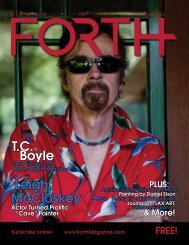John Lithgow: Painter James Ellroy - FORTH Magazine
John Lithgow: Painter James Ellroy - FORTH Magazine
John Lithgow: Painter James Ellroy - FORTH Magazine
You also want an ePaper? Increase the reach of your titles
YUMPU automatically turns print PDFs into web optimized ePapers that Google loves.
Issue 05 • September-October 2009 FICTION<br />
www.Forth<strong>Magazine</strong>.com 9<br />
james<br />
fiction by<br />
k.<br />
redding<br />
hour oF the DAwn<br />
In the summer of 1972, President Richard M. Nixon denied<br />
any knowledge of the five burglars who entered the office of the<br />
Democratic National Committee, the last US combat troops finally<br />
departed from a naval stronghold in Southern Vietnam, and I went<br />
to Savannah to die. I had never been to Georgia before. I knew of<br />
Savannah only from what I’d learned in the tones and faces of oilpainted<br />
jazz legends and in the subtle memories spilled quietly by<br />
my father years before. But in the sticky climate of that hot, political<br />
summer, I was determined to find a peace I had never known.<br />
The kiosk that sold liquor and cookies at the train station carried<br />
travel guides, which pointed me to the library on the north end of<br />
Savannah. The library where my father had worked in his youth,<br />
where he had spent peaceful times and long nights with Goethe and<br />
Blake and Lewis. I wasn’t about to pay for a room, hadn’t planned<br />
on being around come nightfall. Today would be the day. The pain<br />
had become unbearable—the tightening in my chest, the anxiety,<br />
the curling of stomach and mind, all twisted together, all brewing<br />
in the final moments of my life. yes, today. Three or four hours. I<br />
was sure of it.<br />
On the trolley, I watched the townsfolk speak to each other.<br />
There was a certain elegance about their manner—the southern<br />
dialect, cool and easy—it was the kind of smooth tone spoken by<br />
a people without concern, who would return to their narrow white<br />
homes across from a small park and take pleasure in the sunflowers<br />
that graced the foyers of their living rooms. There seemed to be some<br />
simplicity in their voices, a gentle confidence in their eyes. I longed<br />
for a moment in that southern mood. Perhaps it’s what I came here<br />
to find, a bit of the peace I craved.<br />
It was still morning when I arrived across town at the MacArthur<br />
Library. I stepped out into the cool air and onto the grass of the park<br />
Illustration by Brandon Francis | <strong>FORTH</strong> Artist<br />
across the street, staring up at the massive, colonial structure. It stood<br />
on a row of white pillars, though the paint ran yellow in certain<br />
corners and cracked in tiny veins that ran to the very top of the<br />
building, as though the library were an old, living creature, wrinkled<br />
and worn now by time.<br />
Approaching, I came across a podium that stood waist-high and<br />
boasted a bronze plaque, nobly declaring the origins of the library.<br />
According to the fixture, this had been the estate home of a Mr.<br />
Wilbur Holmes in 17 . After giving up most of the rooms in the<br />
house to soldiers during the war between the states—General Lee<br />
himself had stayed here for an entire week during the capture of Fort<br />
Pulaski in 1 62—it had been donated to the city by Mr. Holmes<br />
as a memorial for Savannah’s valiant war efforts and support. A<br />
structure of pure memorial, a salute to the gallantries of war…as I<br />
too shall be.<br />
I steepled up the narrow stairs to the third story, the faint smell<br />
of cedar mixed with modern cleaning solution settling under my<br />
nose. The cedar told a story of the estate’s blistering age, the kind of<br />
structure they used to build out of local trees rather than imported<br />
lumber. The cleaning scents, though, seemed set on washing away<br />
the smell of that deep-rooted cedar. And somehow, I could almost<br />
hear the march of the soldiers up these stairs, echoing my own steps,<br />
as though the States were still at war and a number of armed men,<br />
teenagers and seniors alike, would be resting downstairs with their<br />
feet up on the old mahogany tables, dressed in dirty grey uniforms<br />
and waiting for news of the northern invaders.<br />
I found a book by Lewis—something about the devil—and<br />
another on the pains of post-war trauma. And a whole section on<br />
the US Civil War and Georgia’s gallant participation in the effort.<br />
They thought of it down here not as a de-unification endeavor to<br />
4Continued on p. 22




